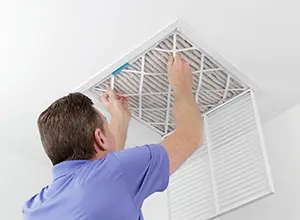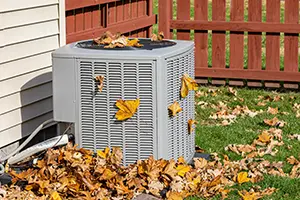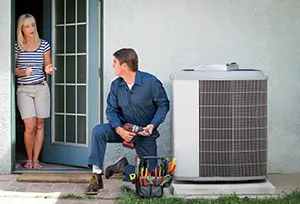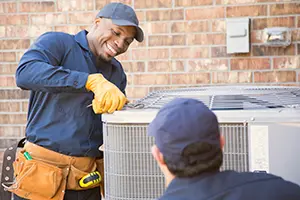In the modern American home, heating, ventilation, and air conditioning — or HVAC — systems are a vital part of everyday life. These systems work by taking in air from your home, regulating its temperature, and recirculating it into your environment. Regular maintenance of your HVAC unit and replacement of its filters will ensure a long life for your unit.
If problems do arise, you can always call experts for maintenance, repair, or HVAC replacement. Luckily, there are plenty of ways to maintain your heating and cooling system on your own. From changing your HVAC filter regularly to vacuuming ducts and setting the thermostat to optimal temperatures, at-home maintenance can add years to the life of your system and keep dollars in your pocket.
Maintaining HVAC Systems
Whether your air conditioner is making that weird noise again or you’re searching for preventative solutions, it’s important to take the proper steps to keep your system working. Here are a few tips to help you do just that:
Tip #1: Change Your Filters

A person changes their HVAC filter as a good practice.Most experts recommend changing your air filter every three months, but if you’re looking to improve the air quality in your home, combat allergies, or keep pet dander to a minimum, it’s wise to change them more often.
First, locate your air filter — it’s usually placed within the blower compartment of your HVAC unit, or in the main air-return vent. Make note of the size and select a new filter that meets your criteria. On most units, the old filter will simply slide out, leaving room to insert a new one. The average cost of HVAC filter replacements varies but can cost around $40 for a high-quality anti-allergen filter. Build this cost into your budget to increase your unit’s effectiveness.
Tip #2: Maintain Clear Airflow

A HVAC system which needs to be cleaned from debris.Clean up any clutter around your outdoor HVAC unit. Debris like leaves, branches, or mulch can reduce airflow and make your unit less efficient. The same goes for indoor air return grates — try not to block these with furniture. Keeping return vents clear provides optimal airflow to heat or cool your home by circulating air more quickly.
Tip #3: Don’t Forget the Thermostat
If your thermostat is battery-powered, check the battery level frequently. When a thermostat’s battery is too low, it can affect HVAC system performance and leave you with unsatisfactory temperatures in your home.
It’s also ideal to keep your home at a consistent, comfortable temperature that doesn’t require your heating or cooling unit to run continuously. During colder months, turn the heat down a few notches when you leave the house, and do the same with the AC in the summer. The less your HVAC unit runs each day, the better and longer it should hold up.
It may be time for a thermostat upgrade: ENERGY STAR reports that smart thermostats save people around 8% in heating and cooling costs each year.
Tip #4: Regular Maintenance and Inspections

A HVAC maintenance man talks with his customer during a HVAC inspection.Perform regular self-inspections of your outdoor unit and other obvious components. Look for broken pieces, blocked vents, mold, or other issues you can unearth with a simple visual inspection.
If you encounter problems you’re unsure how to fix, call a to check things out. Hiring professionals to fix HVAC issues ensures your unit will operate efficiently. You don’t have to wait for a problem to schedule professional maintenance. Scheduling regular tune-ups or HVAC inspections with experts can help prevent issues from arising.
Know When It’s Time for HVAC Replacement
Although the tips above can help extend the life of your HVAC, these systems do not last indefinitely. The average life of a heating and cooling unit is between 10 and 20 years. Depending on the age of your system, it may be time to find the best HVAC replacement for your home.

Two people smile while working on a HVAC replacement project.The average cost of an HVAC replacement varies significantly depending on where you live and the type of system. This typically includes the cost to install an HVAC unit as well. There are a few other factors to take into consideration for your purchase:
- HVAC systems are created for different home sizes. Make sure to choose a unit that will adequately control the temperature of your whole home. Have your home’s square footage handy to help you make the right choice.
- Features and certifications are meaningful when it comes to HVAC systems. Look for an ENERGY STAR-certified HVAC system that’s efficient and environmentally friendly. The units you encounter while shopping will all have energy efficiency numbers as well — the higher these numbers, the more efficient your new unit will be. Features like zone control, filter change reminders, and air purifiers are available in some models, too.
- Keep the location of your HVAC unit in mind while looking at new models and reading reviews. If you have an outdoor unit that is near a bedroom, nursery, or anywhere things need to be quiet, look for units with a lower decibel (dB) rating. Most HVAC systems fall within 40–60dB, but noise-reducing features are now available.
FAQs About HVAC Maintenance
Q: How long does HVAC replacement take?
A: Replacing an HVAC system can take between 4–14 hours. The time varies depending on how many components must be replaced and if the HVAC system has special features or requirements. Contractor and equipment availability will also impact replacement time.
Q: What’s the average cost of HVAC maintenance?
A: Each HVAC maintenance and tune-up visit can cost between $75–200. If repairs are needed, the cost may increase up to several thousand dollars. But regular maintenance and inspections should help keep this cost low.
Q: How much does an HVAC inspection cost?
A: The average HVAC inspection should cost between $200 and $500. While it may seem counterintuitive that inspections cost more than tune-ups, regular HVAC maintenance such as a tune-up usually involves simple cleaning and a visual check, while a full unit inspection covers safety issues and more in-depth preventative diagnostics.
Q: Are HVAC repairs covered by a home warranty?
A: First American Home Warranty plans can protect your budget from expensive repairs or replacement costs when a covered item, such as your HVAC system, breaks.
If you have a First American home warranty, simply put in a request, and we’ll assign a prescreened HVAC professional to determine the next steps. We’ll even take care of all or a portion of the HVAC cost for repair or replacement of covered items and get your heating and cooling back working again.
Please read your contract for specific coverage and limitations. In some instances, Homeowner and First American may agree to payment of cash in lieu of repair or replacement. Payment will be made based on First American’s negotiated rates with its suppliers, which may be less than retail.

